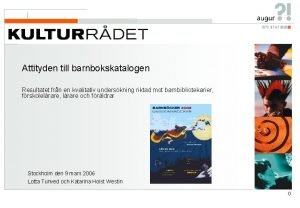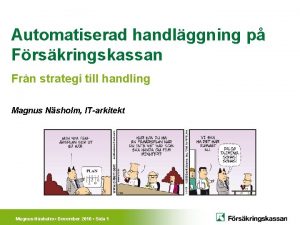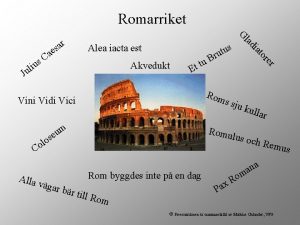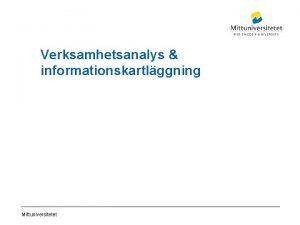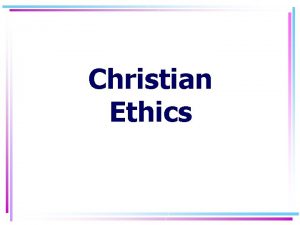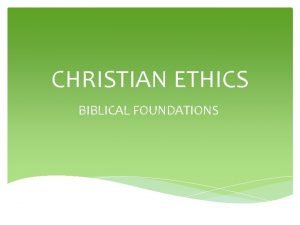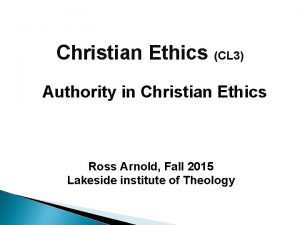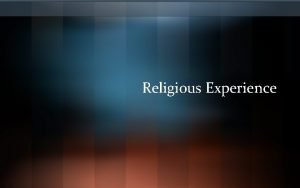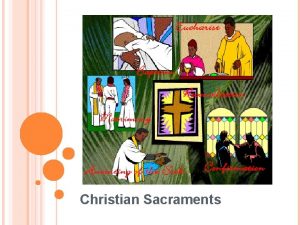RELIGIOUS ETHICS Religious Ethics n For a Christian











- Slides: 11

RELIGIOUS ETHICS

Religious Ethics n For a Christian, making ethical decisions will be guided by a combination of – n The Bible (All) n Conscience (All, especially Orthodox) n Christian Tradition and Church teaching (Catholic, Orthodox) n Natural Law (Catholic) n Situation Ethics (Anglican)

CHRISTIAN SOURCES OF MORALITY n Christians since the Reformation have disagreed about a series of moral issues. The division of the church has lead to the development of three main traditions, each turning to a different source for moral teaching: n Authority – Roman Catholic (the encyclicals or papal n Bible – Protestant (belief that the bible is the teachings and the belief that the pope and Church Councils are infallible) literal word of God) n Conscience – Orthodox (belief that the conscience is the literal voice of God)

MAIN ETHICAL PRINCIPLES n God created human beings in his image and called us to a life of responsibility and freedom n Ignorance and sin have lead to the misuse and corruption of human freedom n Christian ethics therefore does not ask the question “what ought we to do? ” but “what kind of moral persons are we called to become? ”

KINGDOM OF GOD n The announcement of the coming of the Kingdom of God called humankind to put right their relationship with God as preparation. In New Testament times the church thought the Kingdom was on its way soon.

JESUS CHRIST n Jesus was both God incarnate and man who understood man’s fear and weakness THE HOLY SPIRIT n The Holy Spirit is a life-giving force that Christians turn to for guidance on modern ethical issues – It has come to continue the work of Jesus Christ after his death and resurrection.

MORAL DECISION MAKING To make moral decisions Christians look to: n The Holy Spirit n The Bible n The Church community

OLD TESTAMENT n Christianity began as a Jewish sect. The first Christians were Jews brought up to obey the Torah and the laws set down by the Decalogue.

DECALOGUE (Exodus 20: 1 -17) n The 10 commandments are all about: n n n The commandments are: n n n man’s relationship with God (first 3/4) man’s relationships with others in society (last 6/7) Negative commandments – prohibitive Apodictic – categorical and absolute After 1000 years of following the Torah, religious officials had developed a system of obeying the law that made the law more important than the people and the principles it sought to protect.

NEW TESTAMENT n The New Testament upholds the significance of the Old Testament law but corrects the oral law that had evolved in order to protect the written law. Jesus said: n “Do not think I have come to abolish the law and the prophets. I have not come to abolish but fulfil” - Matthew 5: 17 n Jesus’ approach therefore was not one of legal prescriptivism, but more concerned with demonstrating compassion through upholding to the law e. g. the incident/parable of the woman in adultery.

SERMON ON THE MOUNT n The Sermon on the Mount in Matthew 5 also took place on a mount to reflect the authority of Jesus’ teaching. It can therefore be seen as the New Testament equivalent of the Decalogue, as it takes the Law set down by the Torah and updates it. n Jesus teaches that the Law is best fulfilled by demonstrating acts of compassion for example in the story of the Good Samaritan. Compassion cannot be achieved just by conforming to the apodictic negative laws of the Decalogue as the first generation of Christians thought. Christian Ethics is much more demanding than this.


